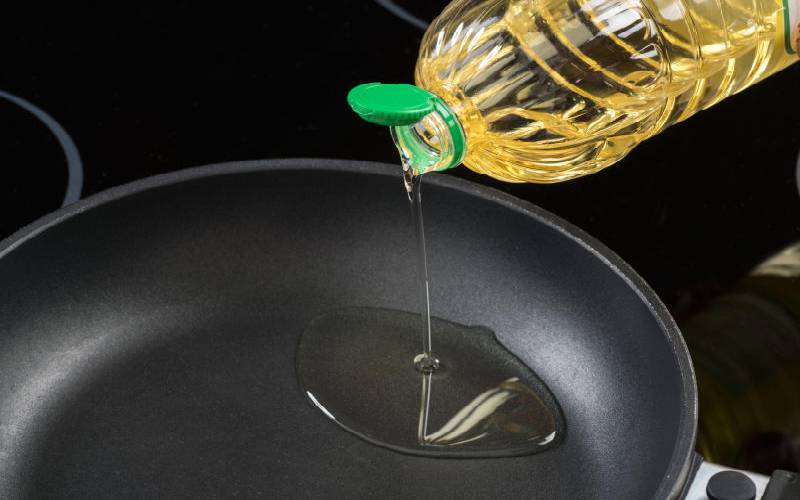
Our supermarkets aisles are filled with a variety of oils, all claiming to positively impact health. According to Euromonitor International, consumers in Kenya are increasingly becoming more aware of health and wellness trends and are beginning to implement lifestyle changes in order to live a healthier life. Does the type of oil we use matter? Studies show it does. Find out how.
Smoke point
Cooking oil’s smoke point is the temperature that the oil starts to burn and break down. Health benefits from oils with low smoking points are easily lost when the oil breaks down at low temperatures. A low smoke point harms the flavour and nutrients in the oil. The oil may even end up releasing harmful compounds when the molecular structure of fatty acids is damaged by heat. The oil will scorch your dish and it may taste bitter or burnt. Such oils are best used for drizzling or dressing salads; mostly on foods eaten raw. On the other hand, cooking is best done using oils with a high smoke point. Such oils will not lose their health properties when heated.
Olive oil
Low smoke point
Regarded by nutritional experts as one of the healthiest oils, olive oil contains vast amounts of monounsaturated and polyunsaturated fatty acids—which make them liquid at room temperature.
Some of its attributes include:
Reducing bad cholesterol
Helps maintain healthy body weight.
Important for heart health— reduce the risk of stroke and heart disease.
Contains Vitamin E that has antioxidant properties.
But…
Due to its low smoke point, olive oil is less able to handle heat and it is best used for salad dressings or low heat cooking.
Avocado oil
High smoke point
Avocado oil offers a great option for high heat cooking due to its high smoking point. Even though avocado is more famous as a fruit in Kenya, its oil is not so popular. It is perfect for stir fries but it is relatively pricey and may lack in flavour. It is rich in monounsaturated and polyunsaturated fatty acids just like olive oil; making it good for heart health. It also contains antioxidants that improve eye health.
Sunflower oil
High smoke point
One of the upsides of sunflower oil is its high vitamin E content. Its high smoke point and mild flavour make it the oil of choice since it does not overwhelm what you are cooking.
But…
The downside of sunflower oil is that it is loaded with omega-6 fatty acids. Even though they have their benefits, they are required in moderation. Omega-6 fatty acids are considered to favour inflammation when they are not balanced with omega-3 fatty acids that are anti-inflammatory.
Coconut oil
High smoke point
Unlike other available plant-based oils, coconut oil is high in saturated fat. Experts say that it is safe to use coconut oil in moderation. Too much saturated fat can cause weight gain, raise cholesterol levels and increase the risk of heart disease and stroke. Research published in the Journal of Clinical Investigation cautions that people who regularly consume foods rich in saturated fats may develop chronic insulin resistance and fatty liver disease that puts them at risk of diabetes. However, the effects may not be as severe for healthy people who only occasionally consume fatty meals. When consumed in reasonable amounts, coconut oil isn’t harmful to your heart. It is also popular for skin and hair care where it is considered therapeutic.
Vegetable oil
High smoke point
This is one of the most common types of oils we find in our kitchens. Vegetable oils are refined and highly processed forms that are extracted from a combination of plant sources—such as corn, soya bean and sunflower. They are guaranteed to have a high heat tolerance. They may lack flavour and nutrients due to heavy refining, but they offer a good option for deep frying.
Ghee and Butter
Butter and ghee are derived from animal sources; cow’s milk in particular. Ghee is clarified butter. It is obtained by heating butter and allowing the milk and liquid portions to separate from the fat. Once the milk solidifies, the remaining oil is ghee. Ghee contains reduced dairy products than butter making it more suitable for people with lactose intolerance.
Ghee can also withstand heat better than butter making it more suitable for roasting and baking. Even though they have negligible differences in fats and calories; they should both be consumed in moderation. Choose the one that positively impacts your health especially if you are sensitive to lactose.
-Nancy Nzalambi is a public health research scientist
 The Standard Group Plc is a multi-media organization with investments in media platforms spanning newspaper print
operations, television, radio broadcasting, digital and online services. The Standard Group is recognized as a
leading multi-media house in Kenya with a key influence in matters of national and international interest.
The Standard Group Plc is a multi-media organization with investments in media platforms spanning newspaper print
operations, television, radio broadcasting, digital and online services. The Standard Group is recognized as a
leading multi-media house in Kenya with a key influence in matters of national and international interest.











